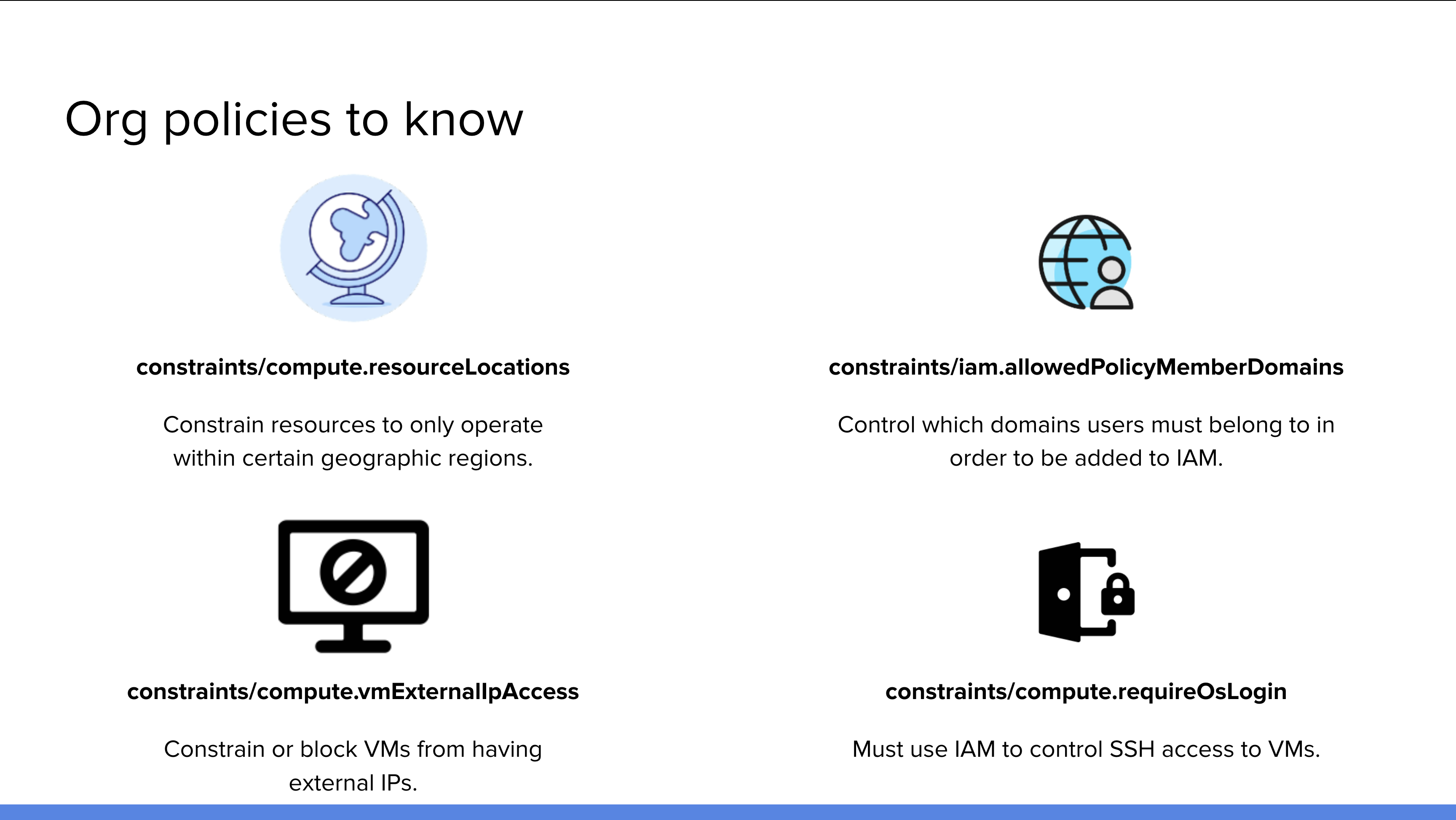Org Policies in GCP
In today's digital-first world, businesses face numerous challenges in maintaining security, meeting compliance requirements, and ensuring consistency across their cloud environments. When managing cloud resources, organizations need centralized tools to enforce rules and avoid potential pitfalls, such as data breaches or regulatory violations. Google Cloud Platform (GCP) provides a robust solution in the form of Organization Policies—a key tool for governance, compliance, and resource management. This article delves into the significance of Organization Policies, how they function, and their role in cloud governance. Whether you’re managing a large enterprise or preparing for the Professional Data Engineer certification, understanding Organization Policies is essential.
Why Organization Policies?
Imagine you're running a business, and for compliance or security reasons, you need to ensure that all data remains within the United States, block traffic from certain countries, or enforce encryption for all Virtual Machines (VMs). Manually monitoring every resource and project to meet these requirements would be impractical and error-prone. This is where Organization Policies come into play. With Org Policies, you can enforce these rules across your entire organization, ensuring compliance and security while allowing your teams to focus on innovation.
What Are Organization Policies?
Organization Policies are centralized governance tools in GCP. They allow administrators to define and enforce organization-wide policies on resource usage, constraints, and configurations. These policies can be customized to meet specific compliance needs, providing flexibility and control over how resources are deployed and managed. Key features of Organization Policies include centralized control, which enables consistent rule enforcement across all projects and resources; customizability, allowing policies to align with unique organizational requirements; enhanced security, by enforcing measures like encryption and access restrictions; and integration with IAM, combining resource control with access management for comprehensive governance.
Use Cases for Org Policies
Security compliance is one of the primary use cases for Organization Policies. Security is a top priority for any organization, and Org Policies can enforce standards such as requiring encryption for all VMs, blocking external IP addresses to prevent public exposure, and restricting SSH access to IAM-based OS Login. These measures ensure that your resources adhere to the highest security standards. Another key use case is resource configuration enforcement, which allows you to control how resources are deployed. For example, you can restrict resource deployment to specific geographic regions, ensuring that all data remains in the United States or other designated areas. This avoids misconfigurations that could lead to compliance violations or increased costs. Domain restriction is another powerful feature of Org Policies. To safeguard your resources, you can enforce policies that limit access to users from specific domains, ensuring only authorized personnel can access critical resources.
 Key Org Policies to Know
Key Org Policies to Know
Here are some of the most important Org Policies to understand, especially for the Professional Data Engineer certification. The constraints/compute.resourceLocations policy restricts resources to specific geographic regions. This is crucial for ensuring data residency compliance by keeping resources within designated areas like the United States or Europe. The constraints/iam.allowedPolicyMemberDomains policy controls which domains users must belong to in order to be added to IAM policies. This enhances security by limiting access to trusted domains. The constraints/compute.vmExternalIpAccess policy blocks or restricts VMs from having external IP addresses, reducing the risk of attacks by preventing public exposure. Finally, the constraints/compute.requireOsLogin policy requires IAM-based OS Login for accessing VMs. This simplifies access management and improves security by centralizing control through IAM.

How Org Policies Work: Inheritance and Exceptions
Org Policies operate within GCP’s resource hierarchy, which consists of the Organization, Folders, and Projects. Policies set at higher levels (e.g., Organization) are inherited by lower levels (e.g., Folders and Projects). For example, a policy restricting resource locations to the United States, applied at the Organization level, will automatically apply to all projects within the organization. While inheritance provides consistency, exceptions can be made at lower levels to meet specific needs. For instance, a Folder or Project can override an inherited policy to relax or tighten restrictions. This allows flexibility while maintaining overall governance. The ability to create exceptions ensures that Org Policies strike the right balance between centralized control and team autonomy.
Integration with IAM
Org Policies and IAM are complementary tools in GCP’s governance framework. While IAM determines who can access resources and what actions they can perform, Org Policies define how resources can be used. By combining these tools, you can enforce both access control and resource constraints, creating a secure and compliant cloud environment.
Benefits of Organization Policies
Org Policies offer several key benefits. They improve security by enforcing measures like blocking external IPs and requiring encryption, minimizing vulnerabilities and unauthorized access. They help organizations meet regulatory compliance requirements, such as data residency and access control standards. Org Policies optimize costs by preventing misconfigurations or unnecessary resource usage. Finally, they enhance operational efficiency by reducing the administrative burden of manually managing resources across projects.
Preparing for the GCP exams
For those pursuing GCP certifications, understanding Org Policies is important. The exams often include scenarios where you must apply Org Policies to meet security or compliance requirements, understand how inheritance and exceptions work within the GCP hierarchy, and leverage Org Policies alongside IAM to enforce governance.
In Conclusion
Organization Policies in GCP are indispensable for businesses aiming to maintain security, achieve compliance, and streamline resource management. They provide centralized, customizable governance tools that ensure your cloud environment remains secure, compliant, and aligned with organizational goals. By understanding and effectively leveraging Org Policies, you can prevent security breaches, avoid compliance violations, and optimize resource usage. Whether you’re managing a large organization or preparing for certification, mastering Org Policies is a critical step toward building a secure and efficient cloud infrastructure.

.png)


